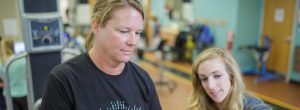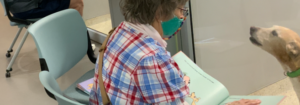Rebecca Steinen: A Recovery Journey Driven by Optimism, Hard Work and a Desire to Give Back

Back to physical health resource hub
Written by: JoEllen Gilbert M.S.,CCC/SLP
Rebecca Steinen suffered a stroke in July 2016 at the age of 46. At the time, she was living in Boston and working as a Regional Sales Director for a large corporation. Her job required weekly flights to the various offices she managed and oversight of more than 60 employees. In addition, she was responsible for leading workshops to teach effective sales techniques and communication skills to her sales staff to facilitate their ability to negotiate and close large business deals. Rebecca’s stroke changed all of that: leaving her with aphasia, vision deficits and weakness.
After she and her fiancé moved to Jacksonville, Fla., Rebecca began attending the Brooks Rehabilitation Aphasia Center (BRAC) in October 2021. Initially, she attended the BRAC community group aphasia program twice a week. However, it became evident pretty early on that her talents were needed in a more involved capacity at BRAC. Rebecca began teaching a weekly art group for the members. This quickly expanded to twice a week in order to reach even more BRAC members.
Each week, Rebecca selects an art project, establishes step-by-step instructions with visuals and determines the supplies needed. She then sends that information to JoEllen Gilbert, CCC/SLP, BRAC staff mentor, as well as the student intern assisting her that semester. The written and visual instructions are then put into an aphasia friendly handout to be followed by the BRAC art group members. Rebecca’s art group has opened the door to a beautiful form of expression for many persons with aphasia and several budding artists have emerged as well!
Rebecca also participates in the Brooks Peer Mentoring program at Brooks Rehabilitation Hospital – University campus. She visits patients at the hospital once a week and makes phone calls to past patients to encourage them to return as peer mentors. She was part of a select small group of volunteers who worked with Ann Popik in Brooks Volunteer Services to review and revise the Peer Mentoring Policies and Procedures Manual and make improvements to the program. Rebecca states that she loves encouraging and motivating people who have experienced a life-changing health event and are beginning a lengthy recovery journey. She feels that sharing her own journey may inspire and give them hope.
Other Brooks programs that Rebecca participated in over the last two years include the “Helping Hands” art group and the “Storytelling” Zoom groups offered by Brooks Adaptive Sports and Recreation. She also participates in the BRAC Mental Health group via Zoom.
Rebecca states that the improvement in communication skills and the increased confidence that she has acquired from participating in the various Brooks programs have given her the courage to pursue some ventures of her own. She has collaborated with another woman (also with aphasia) to form an online book club for people with aphasia. The book club members are from all across the United States. They collectively vote on the book they want to read and then meet weekly to discuss the assigned chapters for that week. While her partner takes on the role of host for the group, Rebecca’s job each week is to prepare aphasia friendly questions (multiple choice; phrase completions) and conversation probes to promote discussion and reading comprehension. She is eager to see this group expand as more persons with aphasia learn about it.
In addition, Rebecca is active with facilitating the growth of a befriending outreach program designed to connect persons with aphasia who are further along in their recovery with persons with aphasia who are still early in their recovery journey. This outreach is part of the non-profit organization, National Aphasia Synergy, Inc. (NAS), begun by Trish Hambridge, a person with aphasia.
As you can see, Rebecca Steinen is finding many ways to advance her own aphasia recovery by helping others in the process. She states that her greatest joy now is “seeing the lightbulb go on when someone realizes they can do it themselves”.





